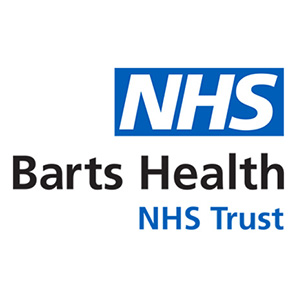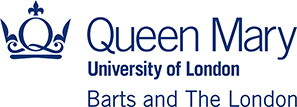- WIPH
- Study with us
- Postgraduate Research
- Wellcome Trust PhD Programme in Science
Wellcome Trust PhD Programme in Science
Health data in practice: human-centred science
Research area: Population and Public Health
This programme has now recruited its final intake of students. See the WIPH PGR pages for other opportunities.
Follow us on Twitter: @hdip_dtp
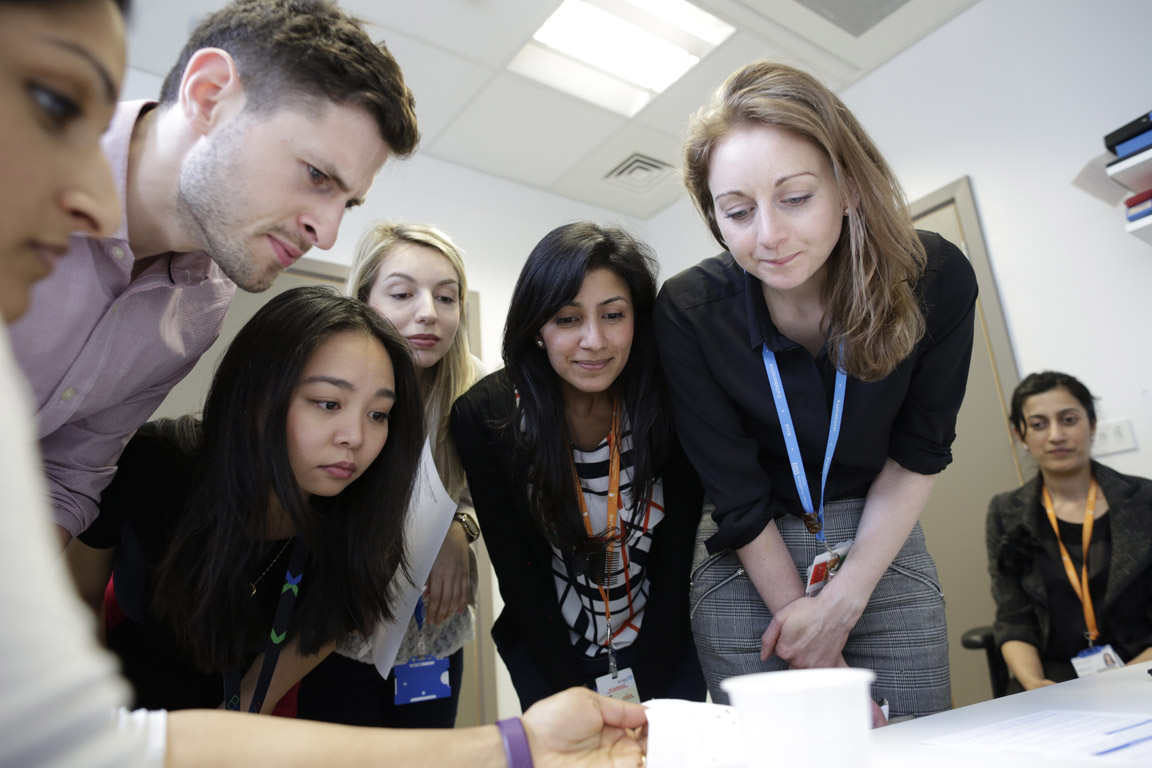
A group of students looking over some data
Our Wellcome-funded doctoral training programme applies human-centred data research to health and care data, and will introduce you to a wider context for your research, enabling you to draw on concepts, disciplines and methods underpinning algorithmic designs, sensing and data capture, human-interactions, qualitative and quantitative evaluation and decision-making, in real-world settings. You will develop as a future scientific leader able to apply interdisciplinary perspectives to your research and realise the potential of innovations in health data research for the benefit of patients, the public, health care systems, and society.
The Wellcome Trust Health Data in Practice programme combines scientific excellence with a commitment to improving the working environment and transition support for trainees. We commit to being part of an evolving community of practitioners who will develop and share practice to bring science and culture together, placing both firmly at the heart of what we do.
For details of our current students and their research. click here.
 The availability, scale and depth of data collected in the course of health care, by or about patients – combined with data-driven approaches to its analysis – is creating a paradigm shift in health care and its delivery. Machine learning and other automated methods of analysis will only succeed in providing useful insights for health and care if we understand health data in practice: how data is actually generated, interpreted and used.
The availability, scale and depth of data collected in the course of health care, by or about patients – combined with data-driven approaches to its analysis – is creating a paradigm shift in health care and its delivery. Machine learning and other automated methods of analysis will only succeed in providing useful insights for health and care if we understand health data in practice: how data is actually generated, interpreted and used.
Human-centred data science operates ‘at the intersection of human-computer interaction, computer-supported cooperative work, human computation, and statistical and computational techniques of data science’ while preserving ‘the richness associated with traditional methods while utilising the power of large data sets.’ We adapt this concept to the 'health data in practice' doctoral training programme with the goal of developing highly skilled future leaders able to apply interdisciplinary perspectives to research and innovations in health data science for the benefit of patients, the public, health care systems and society.
 Our east London location
Our east London location
Barts and The London is committed to pioneering medical education and research. Being firmly embedded within our east London community, and with an approach to education and research that is driven by the specific health needs of our diverse population, the programme will draw on these networks to enhance your research.
Programme management team
Director; Professor and Chair of Health Data Science
Director; Professor of Biostatistics and Health Data Science
Professor of Health Economics; 'Effective and Efficient Evaluation' Theme Leader
Professor of Human Interaction; ‘Human-Data Interaction’ Theme Leader
Professor Deborah Swinglehurst
Professor of Primary Care, Director of Postgraduate Studies; ‘Health Data in Practice’ Theme Leader
Associate Director, Lecturer in Social Science
Associate Director, Lecturer in Social Science
Dr Harriet Larvin
Associate Director, Research Fellow in Health Data Science
Associate Director, Senior Lecturer in Computer Science
Associate Director; Lecturer in Genetic Epidemiology
Associate Director, Senior Health Economist
Programme and Researcher Development Manager
For queries regarding the programme please contact hdip-dtp@qmul.ac.uk.
Year 1: MRes in Health Data in Practice
The MRes programme will provide:
- an introduction to key concepts and research methods and analysis highlighting relevant methodological issues and challenges that comprise the interdisciplinary foundations of the programme and will include an introduction to research design, qualitative and quantitative methods, and societal and ethical issues related to data technologies
- experience of possible research areas for further study including opportunities to apply the knowledge gained and undertake a small research project during the MRes year
- an environment in which you can develop a solid understanding of the wider context of health data and critical thinking in this field.
The programme comprises:
- Three compulsory taught modules (worth 75 credits in total)
- Three optional taught modules (worth 15 credits each)
- One project module (worth 60 credits)
Total – 180 credits: Level 7
Years 2-4: PhD
The programme is framed in four scientific themes: Human-data interaction; Health data in practice; Effective and efficient evaluation; and Actionable information. You will work with your supervisors to develop an interdisciplinary research proposal within one of these four themes.
More information on the themes
You are expected to pass the six- to nine-month progression via a 2,000-word report and a short 10-minute oral presentation to a Progression Panel comprising supervisor(s), relevant Director of Graduate Studies and the Programme Director or Co-Directors.
There are further milestones at 18 months (20,000 word report to the same assessors), and again at 30 months (to include additional data since the 18 month report plus a plan of the thesis).
Transfer to write-up status in the final year is considered a progression point and submission of the thesis within four years is a requirement.
You will also be supported to submit at least one manuscript and to present at relevant national/international scientific meetings during your studentship.
We have a pool of supervisors across all three faculties. Students are support to assembles a supervisory team for their PhD project during the MRes and are required to co-produce a research proposal prior to starting their PhD.
Details of our current supervisor pool are below.
| Ruth Ahnert | Professor of Literary History & Digital Humanities | English and Drama | Digital humanities; Quantitative network analysis; interdisciplinary theory, values and practice. |
| Eldad Avital | Reader In Computational Fluids & Acoust | SEMS | Energy Systems, Computational Fluid Dynamics, Multiphase Flows, Thermofluids Engineering, Biofluid dynamics, Hydrodynamics, Aerodynamics, Fluid structure interaction |
| Nikesh Bajaj | Lecturer In Data Science | SPCS | My Interest is more around Healthcare and Biomedical with AI. I worked at Imperial College London, at NHLI, faculty of medicines for almost two years as postdoc, where I worked closely with clinical fellow and biomedical students on clinical problems. |
| Michael Barnes | Professor of Bioinformatics and Director of the Centre for Translational Bioinformatics | WHRI | Precision medicine, Multiomics/phenomics, AI/ML algorithm development for precision medicine |
| Conrad Bessant | Professor of Bioinformatics, Turing Fellows, Co-Director, Computational Biology Centre | SBCS | Multi-omics and integration of health data; statistics, machine learning, sequence analysis, proteome informatics, software development |
| Georgia Black | Reader In Health Services Research | WIPH | (1) the impact of GP-patient communication on patient safety in cancer pathways and (2) the effect of socioeconomic inequalities and specifically exclusion from healthcare. |
| Oleg Blyuss | Reader in Data Science and Statistics | WIPH | • Predictive modelling • Machine learning • Longitudinal data analysis • Medical statistics • Early detection of cancer • Cancer biomarkers • Fuzzy clustering |
| James Buchanan | Senior Lecturer In Health Economics | WIPH | • Genetic and genomic testing • Precision medicine • Cancer (including multi-cancer early detection testing) • Rare diseases • Newborn screening • Economic evaluation (including early economic evaluation) • Health technology assessment • Costing and costing methodology • Valuing health and non-health outcomes • Stated preference techniques |
| Ignacio Castro | Lecturer in Data Analytics | EECS | The economics of interdomain traffic, and encompasses from peering, transit and other types of interconnections to the underlying economics of the Internet architecture. My interests and expertise relate to data science, algorithms and privacy. Themes within my interest and expertise include: - Actionable information and in particular the collection and analysis data (structured or not). My work heavily relies in methods to collect and analyse large bodies of data which is frequently longitudinal (e.g., across the life course) and unstructured (using NLP techniques), as well as place level data. For instance, I collected Nextdoor data for neighbourhoods in the US and UK associate them to socioeconomic census-based variables and analyses the unstructured data posted by the users (ICWSM 2013). - Health Data in use and practice. My work analyses how organisational/institutional context shapes data and how decision making is done by using computational approaches ranging from NLP to complex networks and graph theory (ICWSM 2022, ACL 2023). - Human-data interaction. Most of my work produces actionable algorithms to address challenges identified in the analysis of large datasets,. These algorithms frequently rely on ML and federated learning approaches, strive for explainability and have the user and its privacy at its core (SIGMETRICS 2022, WWW 2023). |
| Li Chan | Prof of Molecular Endocrinology & Metabolism | WHRI | My work can fall into a number of the themes but especially actionable information (data across the life course and patient reported information). |
| Claude Chelala | Professor of Bioinformatics, Training Lead, HDRUK London; Co-Director, Computational Biology Centre | BCI | Precision medicine; data mining; computational and integrative bioinformatics; integrated genomic and electronic health records; cancer outcomes |
| Megan Clinch | Reader In Anthropology Of Public Health | WIPH | Social anthropology; complex interventions; qualitative methods; public engagement; socio-cultural interfaces |
| Anthony Constantinou | Senior Lecturer | EECS | My expertise is in causal machine learning and causal Bayesian networks. I work with algorithms that aim to recover the underlying cause-and-effect structure of the input data, with or without causal knowledge elicited from domain experts (who could be healthcare professionals). These models are deployed under causal hypotheses, which in turn enable simulation of hypothetical interventions to determine their effect for optimal decision-making under uncertainty. Part of my research already involves applying these methods to healthcare. |
| Paul Curzon | Professor of Computer Science | EECS | Interaction Design; Human Computer Interaction |
| Anna Di Simoni | Reader in Primary Care Research | WIPH | Primary care and health services translational research; digital interventions; medications adherence; self-management |
| Ildar Farkhatdinov | Senior Lecturer in Robotics | SEMS | My relevant expertise is medical/rehabilitation/assistive robotics and technology. I work closely with the Centre for Sports and Exercise Medicine, WHRI (Dr Stuart Miller and Professor Dylan Morrissey) Potential PhD topics/areas: • Remote physiological data acquisition and analysis to improve patient engagement in post-stroke tele-rehabilitation and training at home using robotics and virtual reality • Using accessible wearables and smartphone data to improve physical and mental well-being of wheelchair users |
| Yan Feng | Reader In Health Economics | WIPH | Quality of life research, economic evaluation alongside clinical trials, health policy evaluation, pay-for-performance incentives in primary and secondary care, and applied micro-econometrics in health. |
| Nina Fudge | Lecturer In Social Science | WIPH | Social science, ethnography, anthropology, stroke, polypharmacy, translational research, citizen and patient participation |
| Matteo Fumagalli | Senior Lecturer In Genetics & Teaching | SBBS | In my research, I use statistics and computer science to solve complex questions in human genetics and evolutionary biology. I am a strong advocate of open-source and open-access science initiatives such as Peer Community In. |
| Garth Funston | Senior Lecturer & Hon Cons In Primary Care Cancer Research | WIPH | early cancer detection; health inequalities; cancer survivorship. |
| Meredith Hawking | Lecturer in Social Science | WIPH | Narrative research, qualitative methods, illness experience and practices, decision making, health communication, medicines adherence |
| Patrick Healey | Professor of Human Interaction & Director of Publicity and Communication | EECS | Human communication using digital technologies; design for human interaction; digital capture |
| Richard Hooper | Professor of Medical Statistics | WIPH | Efficient and innovative clinical trial design |
| Anne Hsu | Lecturer | EECS | My work combines computer science and psychology. My research includes human computer interaction, behavioural economics, cognitive psychology, and spans topics of reasoning, wellbeing, health, behavioural change and gamification. |
| Katja Ivanova | Lecturer In Human Machine Interaction | EECS | My long-term research goal is to develop assistive robotic systems for medical applications and solutions for robot-assisted motor learning in diverse fields that are designed with humans and for humans. To achieve this goal I focus on human users by considering and integrating factors from robotics, data science, neuroscience, psychology and clinical expertise. In my research, I follow an experimental approach that is data-driven in developing new technology and quantifying user ability. The application fields of my research include stroke and cerebral palsy rehabilitation as well as diagnosis of ASD based on motion patterns. |
| Julia Ive | Lecturer In Natural Language Processing | EECS/DERI | NLP; generation of natural language |
| Stavroula Kanoni | Reader In Nutrigenetics & Cardio Health | WHRI | Dr Stavroula Kanoni is interested in elucidating disease-related mechanisms in multi-ancestry cohorts and ethnic diverse populations and developing innovative therapeutic strategies, to alleviate or modulate the impact of environment on health. Her research aspires to incorporate multi-disciplinary approaches, sophisticated analytical methods and multi-modal data (genetic, epigenetic, biochemical, metabolomics, environmental and lifestyle data), as a new model for improved diagnosis and treatment of complex diseases in the era of precision medicine. |
| Marta Karbonits | Professor in Endocrinology and Deputy Director of the WHRI | WHRI | Etiology and tumorigenic process of familial and sporadic pituitary adenomas |
| Hemant Kocher | Professor of Liver and Pancreas Surgery | BCI | Tissue banking, clinical trials, innovative surgical techniques, epidemiology, meta-analysis and patient care pathways |
| Harriet Larvin | Research Fellow In Health Data Science | WIPH | Visual perception and non-verbal social communication; social neuroscience; judgements of gaze and facial expressions in clinical populations |
| Silvia Liverani | Reader in Statistics | Maths | Biostatistics, Statistics, Bayesian modelling, applications to epidemiology and spatial analyses |
| Simon Lucas | Professor of Artificial Intelligence, Turing Fellow | EECS | Game AI, Machine Learning, Evolutionary Algorithms, Efficient Noisy Optimisation |
| Margherita Malanchini | Senior Lecturer In Psychology | SBCS | My research seeks to understand why we all differ so widely in our abilities to learn, reason, plan and solve problems. I focus on investigating psychosocial and biological pathways that lead to individual differences in cognition, development, and education. I apply an interdisciplinary approach that brings together knowledge and methodologies from psychology, genetics and the social sciences to investigate causes, correlates, and life-long consequences of individual differences in cognitive development and learning. |
| Isabelle Mareschal | Professor in Visual Cognition and Head of Psychology Department | SBBS | Visual perception and non-verbal social communication; social neuroscience; judgements of gaze and facial expressions in clinical populations |
| Eirini Marouli | Reader Of Computational Biology | WHRI | Using human genetics to identify genes that influence common diseases and quantitative traits, including height and adiposity. Computational methods; machine learning |
| William Marsh | Senior Lecturer in Computer Science, Turing Fellow | EECS | Data analytics, machine learning and probabilistic modelling for decision support in medical applications; Safety, reliability and risk |
| Rohini Mathur | Professor of Health Data Science | WIPH | Application of causal approaches, observational epidemiology, and pharmacoepidemiology using large-scale routine electronic health data to inform best clinical practice, guidelines, and policy. |
| Borislava Mihaylova | Professor of Health Economics & Lead of Health Economics and Policy Research Unit | WIPH | Health economics, decision modelling and evidence synthesis to inform health policy, economic evaluations, cost-effectiveness |
| Patricia Munroe | Professor Of Molecular Medicine | WHRI | Molecular basis of cardiac arrythmia’s, hypertension and heart failure. Gene discovery projects; Functional studies of candidate genes from GWAS; Risk modelling for cardiovascular disease; Pharmacogenetics |
| Oyinlola Oyebode | Professor Of Public Health | WIPH | Policy-relevant public health research. 3 main areas: the behavioural risk-factors for non-communicable disease (particularly diet); the health of marginalised (urban) populations; and knowledge mobilisation (that is efforts to bridge the gap between research and practice to improve population health). |
| Ioannis Patras | Professor in Computer Vision and Human Sensing | EECS | Human behaviour analysis; Algorithmic design, User-centred algorithmic representations, Trustworthy Algorithms. Machine Learning |
| Nicola Perra | Reader in Applied Mathematics | Maths/DERI | Mathematical and Digital Epidemiology Dynamics of and on networks Social Networks and Media Cyber security Teams' success and dynamics |
| Steffen Petersen | Professor of Cardiovascular Medicine, Turing Fellow, Centre Lead, Advanced Cardiovascular Imaging | WHRI | AI in healthcare/imaging, Health data science, cardiovascular magnetic resonance, UK Biobank, health economics |
| John Prowle | Clinical Reader in Critical Care Nephrology | WHRI | Pathogenesis, Diagnosis and Treatment and Outcomes of Acute Kidney Injury, Continuous Renal Replacement Therapies in the ICU, Fluid Therapy and Medical Complications of Major Surgery |
| Matthew Purver | Professor of Computational Linguistics | EECS | Computational Linguistics; NLP |
| Zudin Puthucheary | Clinical Senior Lecturer | WHRI | Our research is focussed on both primary and secondary prevention of acquired functional disability following critical illness. We are primarily focussed on physical disability- loss of muscle mass and the resultant decrease in physical activity, and attempts to modify this using nutritional and exercise interventions. |
| Zahra Raisi-Estebragh | Clinical Lecturer | Advanced Cardiovascular Imaging | Big data cardiovascular epidemiology, multi-organ health, and development of novel cardiovascular imaging biomarkers |
| Khalid Rajab | Lecturer In Microwave And Millimetrewave | EECS | My current circumstances are slightly irregular, as I work a day/week at QMUL, with the rest of my time spent in industry. However, with my time at QMUL I have an EPSRC project which is an excellent fit for this programme, as we are researching the use of ambient (wearable-free) sensors to monitor the wellbeing of elderly assisted living residents, and using sensor data to predict changes in health. (more details in the form). |
| Clare Relton | Senior Lecturer in Clinical and Public Health Trials | WIPH | Innovative pragmatic trial designs using routinely collected health data, trials within cohorts’, registry trials |
| Clare Robinson | Senior Lecturer in Medical Statistics | WIPH | Cluster Randomised trials; sample size calculations; issues arising around the design and analysis for clinical trial scenarios that are becoming more frequently used. |
| Caroline Roney | Reader In Computational Medicine | SEMS | My group uses a combination of signal processing, image processing, machine learning and computational modelling techniques to develop novel techniques for investigating cardiac arrhythmia mechanisms from clinical imaging data and electrical recordings. Suitable projects for this scheme would be with collaborators in WHRI and at Bart's using either Bart's Bioresource, UK Biobank or current ongoing clinical studies for cardiac arrhythmia research. |
| Suzanne Scott | Prof Of Health Psych & Early Cancer Diag | WIPH | Application of psychology to early diagnosis of cancer; symptom perception and help-seeking behaviour using psychological theory to understand why people wait before consulting healthcare professionals and use this to design and evaluate interventions to encourage appropriate and timely healthcare use for symptoms of cancer |
| Katie Sheenan | Professor Of Rehabilitation | Neuroscience, Surgery and Trauma | The use of EHR to inform improvements in access to and delivery of rehabilitation with a particular interest in fragility fractures. |
| Moneeza K Siddiqui | Lecturer Genetic Epidemiology | WIPH | Precision medicine in diabetes and related metabolic diseases across diverse human populations. My research uses a combination of genetic, clinical and lifestyle information to understand the causes of diabetes onset, progression and remission. The goal is to understand how diabetes (specifically Type 2 Diabetes) as a disease can be caused by different combinations of genetic risk in different ethnicities. This will enable accurate prediction of individuals at risk early on in their lifecourse. To do this, our group uses a variety of global biobanks containing electronic health records alongside genetic data. |
| Deborah Swinglehurst | Professor of Primary Care, NIHR Clinician Scientist | WIPH | Qualitative methods, linguistic ethnography, discourse and narrative analysis; healthcare interaction and communication |
| Stephanie Taylor | Professor in Public Health and Primary Care | WIPH | Design & evaluation of complex, non- pharmacological interventions; supported self-management; long- term conditions |
| Veronica Toffoluti | Lecturer In Health Economics | WIPH | Association between mortality rates and large macroeconomic shock, through to developing and evaluating intervention for individuals suffering from mental health conditions (such as depression and/or social anxiety) and long-term comorbidities |
| Maria Turri | Senior Lecturer in Creative Arts and Mental Health | Psychiatry | Understanding processes of identification in theatre through psychoanalytic theory |
| Dayem Ullah | Senior Health Data Science Specialist | BCI | Health informatics, cancer epidemiology, pancreatic cancer, computational analysis and data mining for development for biological research. |
| Fiona Walter | Director of the Wolfson Institute of Population Health, and Professor of Primary Care Cancer Research | WIPH | Randomised controlled trials, cohort studies and systematic reviews; patient experiences and qualitative and mixed methods approaches. |
| Yize Wan | Clinical Lecturer | WHRI | I lead epidemiological and data science studies aimed at identifying risk factors for acute illness and hospitalisation, development of persistent critical illness, and long-term outcomes following critical care. This research aims to better understand the interaction between acute declines in health and development of long-term illness. It seeks to identify opportunities to intervene and address determinants of long-term poor health, particularly for disadvantaged patient groups. |
| Jun Wang | Reader In Genomics & Data Science | BCI | I have broad research interests and experience in bioinformatics, cancer genomics and data analytics. These research areas mainly involve developing and applying bioinformatics and computational approaches to analyse large-scale cancer datasets to uncover novel diagnostic and prognostic biomarkers. I also lead the Cancer Research UK Barts Centre Bioinformatics Core Facility. |
| Lin Wang | Lecturer in Applied Data Science and Signal Processing | EECS | Audio and visual signal processing, robotic perception and machine learning |
| Helen Warren | Senior Lecturer In Statistical Genetics | WHRI | cardiovascular genetics and pharmacogenetics, especially relating to hypertension, statin therapy and cardiovascular risk prediction. There are two main strands to her research areas in statistical genetics: (i) genetic discovery of blood pressure, ECG & other cardiovascular traits (ii) pharmacogenetics (blood pressure / anti-hypertensive drugs, lipids / statins) As the lead statistical genetics analyst for the ASCOT and BRIGHT studies, shealso contributes data and results to many international consortia projects for the genetic association of common complex traits. She is an approved researcher for analysis of UK Biobank data and Genomics England data. |
| Jianhua Wu | Professor of Biostatistics and Health Data Science | WIPH | Use of modern statistical methods for applied health research with longitudinal data, in particular the use of electronic health records (such as CRPD, HES, or other linked NHS data) and longitudinal cohorts to understand the disease trajectories, early detection and diagnosis, health inequalities, and risk factors for prevention; machine learning; data-mining; AI techniques. |
| Runguo Wu | Senior Health Economist | WIPH | Disease modelling (cardiovascular disease and cancer); cost-effectiveness analysis; health inequity |
| Yongxin Yang | Lecturer In Financial Technology | EECS | Machine learning (transfer learning, domain generalization, and meta learning) and its applications in finance (portfolio optimization and derivatives pricing) and medical genetics. |
| Juntao Yu | Lecturer in Computer Science | EECS | I am researching natural language processing, and primarily working on named entity recognition, coreference resolution and low-resource learning. In terms of my experience related to the health domain, I worked on a number of papers related to mention detection and named entity recognition and have developed a state-of-the-art NER system for a number of datasets (including a biomedical Genia corpus). I am also a co-investigator on a KTP project working with Open Medical to improve their EHR system using techniques like information retrieval, named entity recognition and entity linking. I currently also working on a New investigation award in the health domain, more specifically on a unified system for named entity recognition and entity linking using knowledge bases like Snomed CT. |
| Shanxin Yuan | Lectureship In Digital Environment | EECS | I joined QMUL as a Lecturer in Jan 2023, and my research revolves around humans, such as motion analysis, body/hand pose estimation, human 3D reconstruction, rendering, and editing. |
| Dominik Zenner | Clinical Reader in Infectious Disease Epidemiology | WIPH | Infectious disease and migrant health |
| Yin Zhou | Academic Clinical Lecturer & Honorary Consul | BCI | Diagnostic safety and quality in primary care, especially in early cancer diagnosis |
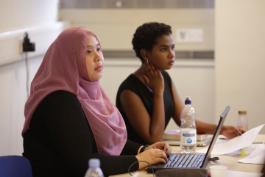 Our training programme will introduce you to a wide context for your science and enable your development as ‘human-centred’ health data scientists capable of drawing on diverse concepts and disciplines and of engaging with real-world settings. Our programme leverages the strong track record of Queen Mary in developing and sustaining an innovative, inclusive and empowering research culture for its students and staff.
Our training programme will introduce you to a wide context for your science and enable your development as ‘human-centred’ health data scientists capable of drawing on diverse concepts and disciplines and of engaging with real-world settings. Our programme leverages the strong track record of Queen Mary in developing and sustaining an innovative, inclusive and empowering research culture for its students and staff.
Our students have access to our enrichment programme; a suite of researcher development workshops and activities designed to enhance their research training skills.
Find out more about researcher development on the programme.
 Our Researcher Development unit provides a comprehensive spectrum of courses and a range of support for PhD students including language training, presentation, critical appraisal, reading and writing skills, leadership, inner coaching, and resilience, time and project management, public engagement and communication skills. You will be expected to complete at least 210 hours of training and development during the course of the PhD, with a minimum required in each of the following four UKRI domains*: Knowledge and intellectual abilities, Personal Effectiveness, Research Governance and Organisation, and Engagement, Influence and Impact. You will also be offered transferable skills training which is reviewed at supervisions when objectives are set.
Our Researcher Development unit provides a comprehensive spectrum of courses and a range of support for PhD students including language training, presentation, critical appraisal, reading and writing skills, leadership, inner coaching, and resilience, time and project management, public engagement and communication skills. You will be expected to complete at least 210 hours of training and development during the course of the PhD, with a minimum required in each of the following four UKRI domains*: Knowledge and intellectual abilities, Personal Effectiveness, Research Governance and Organisation, and Engagement, Influence and Impact. You will also be offered transferable skills training which is reviewed at supervisions when objectives are set.
Every PhD student has a personal tutor who is independent of their academic supervisors, and who monitors their academic progress and provides pastoral care when needed.
*UKRI domains:
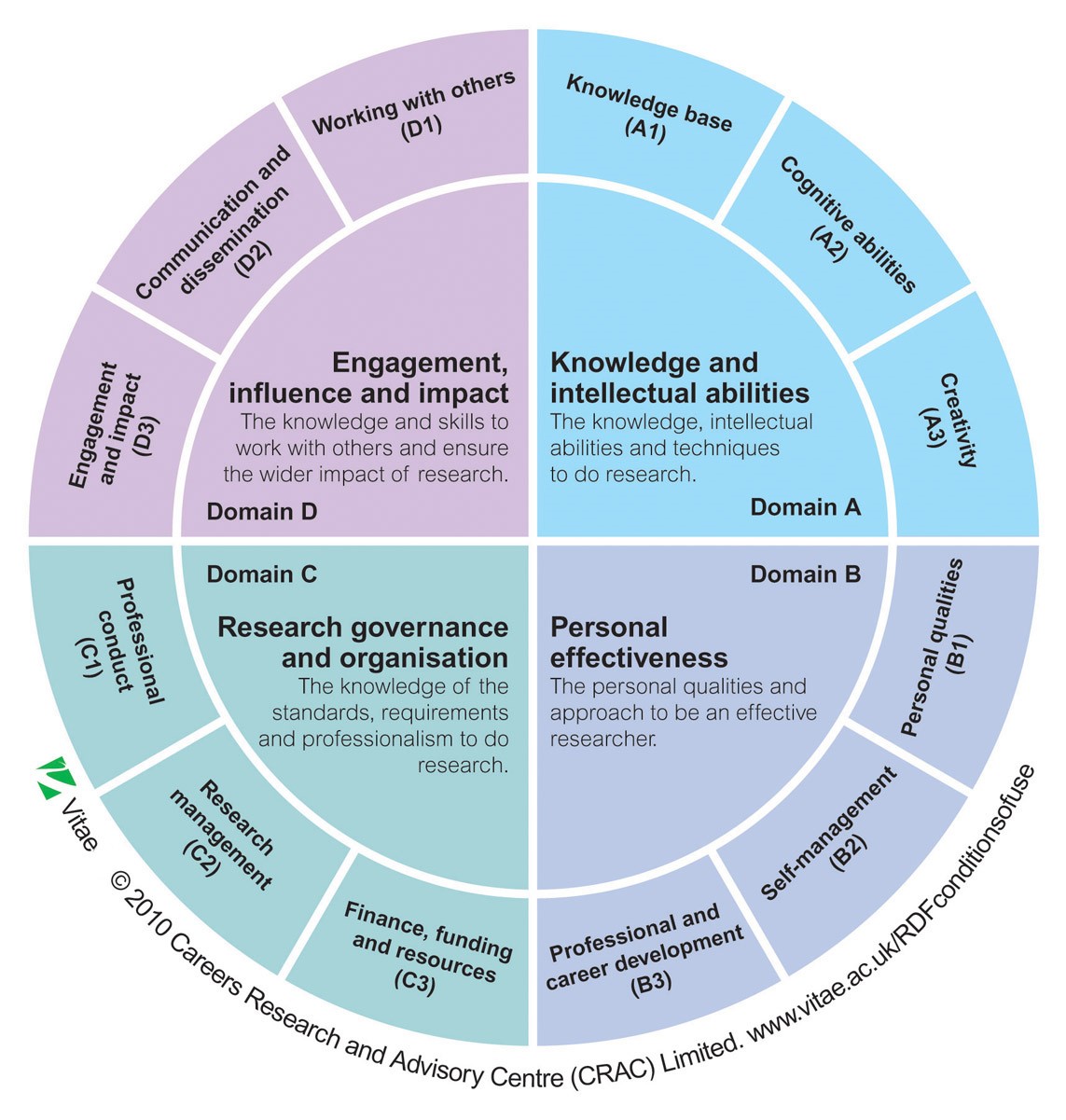
Our vision is to create a vibrant and inclusive interdisciplinary learning environment, which signals the importance we attach to diversity and inclusivity in our interactions, and which provide a safe and welcoming environment in which individuals can flourish and create. Our vision is aligned with that of the Wellcome Trust's Reimagining Research group, which aims to create a research culture that:
- supports creativity, with ambitious and collaborative working across disciplines and institutions
- prioritises diversity and inclusion, so that everyone benefits from supportive relationships no matter what their background
- produces open research, which is conducted with honesty and integrity.
Research environment
You will access science in internationally-leading centres, at the forefront of the science and execution of pragmatic clinical trials, and innovative evaluation of complex interventions and social practice in health care, incorporating ethnographic approaches. It includes leading computer scientists researching human interactions and decision-making, and the development and communication of trustworthy and explainable algorithms, as well as research groups from psychology, digital humanities, bioethics, linguistics and drama applied to health, with whom they interact. It will be closely integrated with the work of the Institute for Advanced Data Science, and Centres for Intelligent Sensing and Advanced Robotics at Queen Mary. Our leadership in the Discovery Programme – an innovative near real-time integrated health record for 2.2 million people – presents an unprecedented and trusted opportunity to access this important and unique asset to understand health data in practice.
NHS
The following NHS organisations will provide access to internships and placements, access to clinicians, patients and commissioners, and channels for dissemination and public engagement:
- Barts Health NHS Trust
- Primary Care Networks and general practices linked to the Clinical Effectiveness Group
- Public Health departments and clinical commissioning groups in Tower Hamlets, City & Hackney, and Newham
- The Discovery Programme: data publishers and stakeholders
Industry
The following organisations will provide access to industry placements for students and potential research collaborations:
Other UK research organisations
HDRUK and The Alan Turing Institute: opportunities for internships, placements and exchange visits including leveraging this site’s international links in Canada and Australia and their role as Welsh Administrative Data Research UK hub.
 You will be supported in your career transition through individualised, coherent career management support with access to mobility opportunities, mentoring, enterprise support and internships, as well as embedding integrated placements and internships within the training pathways.
You will be supported in your career transition through individualised, coherent career management support with access to mobility opportunities, mentoring, enterprise support and internships, as well as embedding integrated placements and internships within the training pathways.
At the end of the third year, you will meet with the Programme Director and your supervisor to discuss career transitions and develop a plan for placements, training and skills development. You will also have the opportunity to apply to the Programme Transition Fund.
The School provides support for work and industry placements for doctoral students reaching the end of their PhD and transitioning into new roles. As well as working closely with the NHS, we have access to industry partners through MedCity’s Collaborate to Innovate programme. Students can access an eight-week QIncubator programme and QConsult – QMUL’s award-winning employability programme.
Careers and Enterprise at Queen Mary
 Queen Mary has two careers consultants dedicated to supporting PhD students, which together with a wide range of events, including PhD alumni discussion panels, speed networking events, and employer-led discussions, can help you to go on to a wide range of careers within academia and beyond.
Queen Mary has two careers consultants dedicated to supporting PhD students, which together with a wide range of events, including PhD alumni discussion panels, speed networking events, and employer-led discussions, can help you to go on to a wide range of careers within academia and beyond.
While conducting your projects, you will receive advice, training and support around project management and presentation skills from the Queen Mary Careers and Enterprise team which also offers a range of support to prepare students for job applications, interviews, work experience, and career choices.
Queen Mary also provides support for PhD students and women researchers from all backgrounds, ages and stages of their lives through the Springboard Women’s Development Programme.
Eligibility information and details of resources the studentships provide, including stipend, is available on the Wellcome website.
You must be a graduate or student who has, or expects to obtain, at least an upper second-class degree (or equivalent for EU and overseas candidates) in a relevant subject. Relevant subjects include quantitative disciplines such as Statistics, Computer Sciences, Mathematics, Bioinformatics and Biomedical Sciences, and qualitative disciplines such as Anthropology, Ethnography and Social Sciences.
Candidates with other relevant qualifications or research experience may also be eligible. Please not that medical, dental or nursing undergraduate degrees are not considered relevant disciplinary areas. For further information please see the application information page.
Successful candidates will display their passion for a career in research, good communication skills and scientific knowledge of the field.
